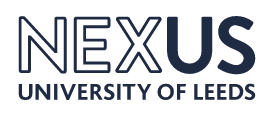Nexus joins forces with Bettakultcha to ask local businesses: Is AI technology equally good and bad?
Nexus has joined forces with Bettakultcha to challenge the local business community to think outside the box and delve into some of society’s most thought-provoking issues.
The first in a series of events will look at AI technology and whether this innovation is equally good and bad for society. Compered by Bettakultcha co-founder Ivor Tymchak and hosted by Nexus Director, Dr Martin Stow, the event will take place at 12:00 – 13:30 on Thursday 21st February at Dakota Hotel Leeds.
Key speakers, including Paul Hallett (Vet AI), Steve Manthorp (University of Leeds, Cultural Institute), Paul Smith (YPO), Elizabeth McKee (Student, University of Leeds) and Tim Difford (Microsoft), will present their views on the topic using Bettakultcha’s short and snappy presentation format – 20 slides, 15 seconds per slide. Speakers and guests will then have the opportunity to network over lunch.
Commenting on the series of events, Dr Martin Stow said: “Most ground-breaking ideas, inventions and products are born from collaboration. It’s about pools of talent coming together to share their expertise, and challenge each other’s thought processes, to drive true innovation. It is this collaborative approach towards innovation that sits at the heart of Nexus, which is why we wanted to create a series of events that encourages people to think outside the box.
“Bettakultcha has an outstanding reputation for tackling some of the world’s most controversial issues and we’re delighted to be working with Ivor on our first event. With seemingly boundless potential, AI technology is an essential part of the technology industry, but its inclusion in everyday life is in its infancy, so it’s interesting to examine AI’s impact on our society, now and in the future and ask; is it good or bad?”
Bettakultcha co-founder, Ivor Tymchak added: “Science should be heretical. How often has science shown that a long-standing human belief is simply wrong? The process always starts with difficult questions. If we’re not prepared to ask these difficult questions science won’t progress. This is why I’m excited about my association with Nexus because they are prepared to continue this scientific tradition of asking the challenging questions, not only to help organisations make the most of research to test and develop ideas, but to also help them to scale and grow. Expect lively debate to ensue from these events.”

